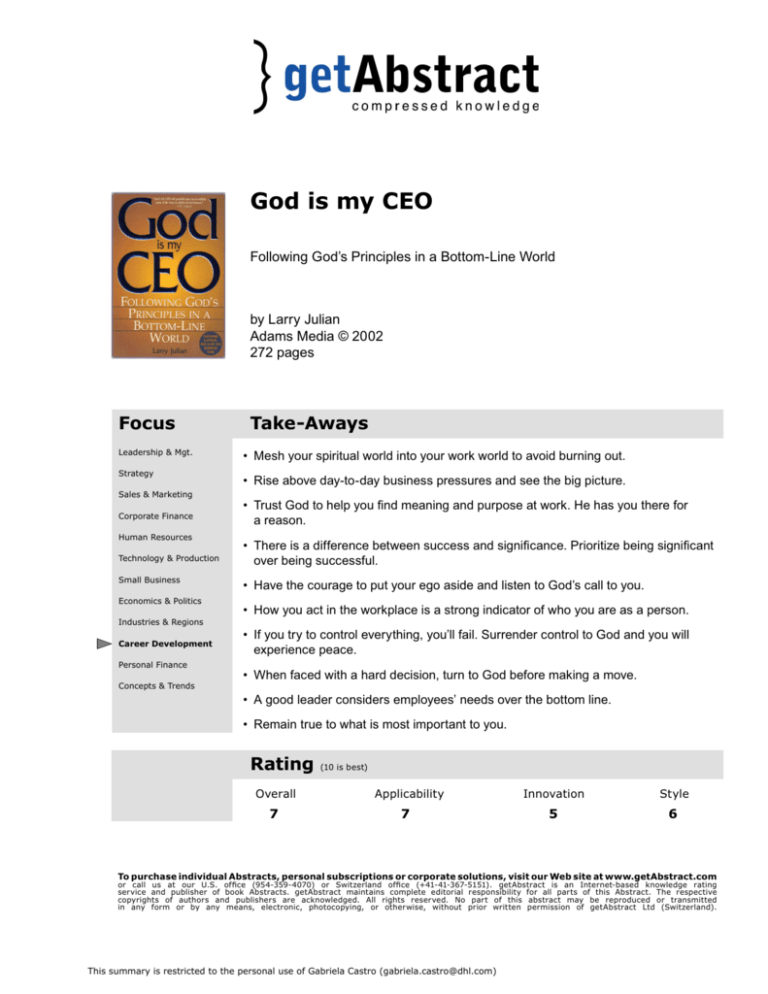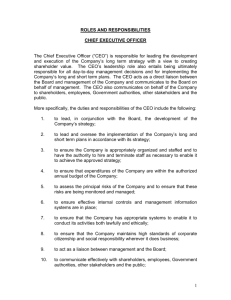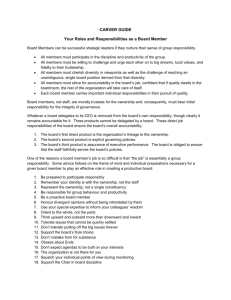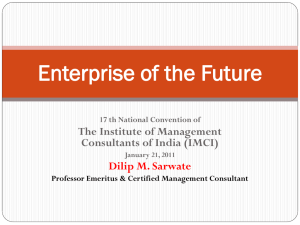
God is my CEO
Following God’s Principles in a Bottom-Line World
by Larry Julian
Adams Media © 2002
272 pages
Focus
Leadership & Mgt.
Strategy
Take-Aways
• Mesh your spiritual world into your work world to avoid burning out.
• Rise above day-to-day business pressures and see the big picture.
Sales & Marketing
Corporate Finance
Human Resources
Technology & Production
Small Business
Economics & Politics
• Trust God to help you find meaning and purpose at work. He has you there for
a reason.
• There is a difference between success and significance. Prioritize being significant
over being successful.
• Have the courage to put your ego aside and listen to God’s call to you.
• How you act in the workplace is a strong indicator of who you are as a person.
Industries & Regions
Career Development
• If you try to control everything, you’ll fail. Surrender control to God and you will
experience peace.
Personal Finance
• When faced with a hard decision, turn to God before making a move.
Concepts & Trends
• A good leader considers employees’ needs over the bottom line.
• Remain true to what is most important to you.
Rating
Overall
7
(10 is best)
Applicability
7
Innovation
Style
5
6
To purchase individual Abstracts, personal subscriptions or corporate solutions, visit our Web site at www.getAbstract.com
or call us at our U.S. office (954-359-4070) or Switzerland office (+41-41-367-5151). getAbstract is an Internet-based knowledge rating
service and publisher of book Abstracts. getAbstract maintains complete editorial responsibility for all parts of this Abstract. The respective
copyrights of authors and publishers are acknowledged. All rights reserved. No part of this abstract may be reproduced or transmitted
in any form or by any means, electronic, photocopying, or otherwise, without prior written permission of getAbstract Ltd (Switzerland).
This summary is restricted to the personal use of Gabriela Castro (gabriela.castro@dhl.com)
Relevance
What You Will Learn
In this Abstract, you will learn: 1) How individual executives successfully integrated
their faith with their leadership practices; and 2) How to create a meaningful work
environment without hurting your bottom line.
Recommendation
So often executives check their faith in God at the door before coming to work. Using
the stories of 20 influential leaders to illustrate 10 business principles, author Larry
Julian skillfully shows that it is possible to integrate your religious faith and your work
practices. These men and women successfully run major organizations, and all of them
credit their belief in God for their achievements. Although some of the stories are more
inspiring than others, this book promises relief from the pressures of the bottom line
and freedom from the stumbling blocks that impede success, both temporal and eternal.
Each chapter includes thought-provoking questions you can contemplate or use as the
basis of further discussions. Julian ends with a step-by-step business plan showing you
how to apply all your newly processed spiritual knowledge as a practical tool. Although
— given that it is dedicated to Jesus Christ — the book seems primarily directed to
Christians, getAbstract.com suggests that any leader who is trying to make a profit, keep
priorities straight and motivate employees should take a look.
Abstract
“God and business
do mix.”
Let Your Faith Define Who You Are
Doing God’s will and running a profitable company doesn’t have to be a dichotomy. In
fact, when you integrate God into your work world, pressures that were once stressful
will empower you. If you prioritize your Godly ideals, over time you will have happier,
more productive employees, which translates into higher longer-term profits, according
to testimony from successful executives who walk their talk of faith and spirituality.
Principle 1: Determining Your Purpose
Medtronic CEO Bill George always knew that God’s purpose for him was to run a major
company in order to influence others in a positive way. But Bill let his ego take control.
Over the years, he turned down repeated offers to become CEO of Medtronic, a $750
million firm and the world’s largest medical technology company. He felt the company was
not big enough to fulfill his grander ambitions. After 11 years, Bill finally accepted the
position with Medtronic and he has come to realize that he is where he was meant to be. At
Medtronic, Bill can speak openly about his values and beliefs and put them into practice.
“The knowledge
that we live our
life with God’s help
provides the confi dence, conviction,
and focus that will
move us forward
regardless of circumstances.”
C. William Pollard heads ServiceMaster, a company that serves a higher purpose.
Although ServiceMaster is publicly held, its mission statement calls for placing God
above profits. Shareholders have offered some resistance, but the firm’s leaders agree that
Godliness provides every employee with dignity and worth. Their goal is to create an
environment that starts with God, and accepts and maximizes the potential of its 250,000
employees. Pollard feels this philosophy has made ServiceMaster profitable.
Principle 2: Success Means Doing Something that Matters
Bob Buford, founder of the Leadership Network Cable Company, learned the hard way
about what is important in life when his only son drowned. Bob learned that success
God is my CEO
© Copyright 2004 getAbstract
2 of 5
“When a person
humbles himself
before God, things
change: priorities,
attitudes and relationships.”
“The greatest thing
you can say about
a person is that he
has integrity.”
“You can’t say it,
think it, plot it or
plan it. People see
the true spirit of
service when it
comes from your
heart.”
“It takes courage
to listen to God
with a totally
honest heart. It
takes greater courage to follow
through on what
we hear.”
is temporary, that his fast-paced work world would end some day and he would face
eternity. He decided to give his business focus an faith-based perspective. He has
dedicated the second half of his life to the Leadership Network, an organization he
founded to support the leaders of large churches.
As a multi-millionaire, Jerry Colangelo already has any material possession he could
ever want. He is the owner of the Phoenix Suns Basketball Club and the Arizona
Diamondbacks Baseball Club and he knows what it’s like to be successful in a worldly
sense. However, the life he leads matters more than the things he has. Jerry says his
relationship with God helped him move his focus off of himself and onto others. His
priorities are God first, then family and then making a difference in the community.
Principle 3: It Takes Courage to Do What’s Right
Al Quie was the Republican governor of Minnesota during the early 1980s, when the
state was in dire financial trouble. The media urged him to decide if he would run for
reelection. While his ego said yes, he realized — after prayer and reflection — that
it wasn’t God’s will, nor would it serve the greater good, so he mustered his courage
in the face of political and public pressure and decided not to run. He also decided to
work alongside his Democratic successor instead of against him. Al’s decision brought
him peace and significantly increased his credibility with the people of Minnesota, who
honored the selfless spirit of his decision.
Having courage doesn’t always mean being outwardly heroic. Marilyn Carlson, Chairman
and CEO of Carlson Companies (an international hospitality company that includes
T.G.I. Fridays, Radisson Hotels and Thomas Cook Travel), was forced to muster more
courage than she knew she had when she lost her 19-year-old daughter in a car accident.
Once she worked through her anger and grief, she knew she had two choices: she could
remain angry or she could create something productive out of her tragedy. She chose
the latter. She spent a lot of time reading her Bible and she believes that God showed
her that time is a gift to use wisely. Slowly, she was able to rebuild her life. She used
the lessons of her tragedy to improve as a leader. She discovered that her day-to-day
decisions defined her leadership. She advises others that God is always there, and that if
you look for messages of hope, you’ll find them.
Principle 4: Patience Provides a Long-Range Perspective
When Tony Dungy took over as head coach of the Tampa Bay Buccaneers football team
in 1996, he inherited a losing team. The pressure to start winning was incredible. Instead
of panicking, Tony remained calm. He had a long-term plan and he refused to cave in
under pressure. Tony says his faith helped him understand that God had a plan for him
beyond winning and losing. His favorite Bible verse is Proverbs 16:3, which it sums up
how he tries to run his team: “Commit to the Lord whatever you do and your plans will
succeed.” Tony’s Buccaneers were the 1999 NFL Central Division Champions.
Archie Dunham, CEO of Conoco, Inc., a large oil company, learned about patience when
he was asked to chair a church building committee and became impatient about the
resistance he faced. An elderly Deacon put it in perspective. He asked Dunham if he was
trying to solve the problem himself or if he was seeking God’s will. Answering honestly,
Archie knew he was leaving God out. After that, Dunham says he handed the problem to
God, and found it solved six weeks later. As a result, he explains that he gave God control
of his career, which blossomed almost instantly. He went from being a middle manager
to Chairman of the Board.
God is my CEO
© Copyright 2004 getAbstract
3 of 5
“Many leaders call
on God like they
call on a consultant, to help them
with their problems.”
Principle 5: Lead by Your Actions
Jeff Coors, former president of Adolph Coors Brewing Company, has a deep personal
relationship with God, but his inability to integrate his faith into the workplace provoked
a personal crisis. His task-oriented nature caused him to lose sight of what God wanted.
Instead of being still and listening to God, Jeff was checking tasks off his list. Jeff found
peace only when he learned how to make the distinction between working for God and
being with God.
John Beckett’s wake-up call to integrate his faith into his work came when the 30
employees of the R.W. Beckett Corporation, a manufacturer of oil furnaces, decided
to try to unionize. After a great amount of prayer and the advice of a good lawyer,
John gave his employees three commitments. He would: 1) blend a compassionate
environment with accountability to create excellent results; 2) commit himself to
employee development and 3) create a culture where family is more important than work.
John backed these commitments with tangible actions and, in the end, his employees
decided not to unionize.
“Does our faith
define who we are
at work, or do
the business rules
define who we
are?”
Principle 6: When Things Are Out of Control, Trust God
Sometimes to maintain control you first need to give it to God. As CEO of Piper
Jaffray Companies, Inc., a respected investment firm, Tad Piper was devastated when
his 100-year-old company was forced to go bankrupt in 1996. After weeks of trying to
fix the business and getting nothing but exhausted, Tad gave God control of the situation
and refortified his faith. He became a calmer, more rational leader and the firm rose out
of bankruptcy and thrived.
Jim Secord knows about the kind of stress that change can bring. His company, Lakewood
Publications, was sold three times within 16 months. Lakewood prospered, but its
employees underwent tremendous uncertainly. Jim knew that he couldn’t stop the changes,
but based on his faith, he felt he could seek hope and minimize damage by staying in
touch with his workers, displaying integrity and preparing them for the inevitable layoffs.
Although it was a difficult time, the employees appreciated Jim’s support.
“God has defined
success His own
way, not the
world’s way; and
He’s provided a
plan for you to succeed His way, not
your way; and His
timing, not yours.”
Principle 7: Between the Lesser of Two Evils, Choose Good
KLGT-TVs most profitable program was “The Jerry Springer Show,” but its low moral
value forced Linda Rios Brook, the station’s general manager, to make a decision about
whether or not to continue to run it. The program’s ratings and revenues were high, but
it just didn’t jive with the station’s family-friendly agenda. Linda considered how God
would want her to handle it and decided to use the show as an opportunity to offering
counseling for people in crisis. She put a crawl on the bottom of the TV screen that
directed people to a biblically-based crisis counseling center in the area. The response
was overwhelming. Linda concluded that because of Jerry Springer’s show, thousands of
people reached out for help.
Brenda Scott had two strikes against her when she became CEO of the Mobile
Convention and Visitor’s Corporation: she was African-American and female. Brenda
inherited an all-male board and an organization beset with serious racial tension. She
asked for God’s help, refused to be intimidated and took the time to listen to her
constituents. Since she became CEO, her organization earned a listing in “Top 50
Convention and Visitor’s Bureaus.”
“Gratitude unspoken is ingratitude.”
Principle 8: Servant Leaders Serve Their Employees
A leader, or — even better — a servant-leader, serves others. Employees at Colle &
McVoy are free to be creative without the fear of making a mistake thanks to the servant
God is my CEO
© Copyright 2004 getAbstract
4 of 5
“I make it very
clear that no one
can claim to be
a better human
being than
another. A dishwasher is as
important in this
organization as a
vice president.”
leadership of Jim Bergeson. Jim is a disciple of the philosophy of putting people over
profits and he consistently puts the needs of his employees and clients over his own
needs. In response, his employees are loyal and they deliver top-notch results, which in
turn makes clients happy.
Although he has a completely different style, Horst Schulze runs his hotel company in
much the same manner. He closely follows the biblical principle of making sure all of his
employees maintain their dignity and receive the respect they deserve. In addition to the
intrinsic value of letting people know their worth, he has one of the lowest turnover rates
in the industry.
Principle 9: To Balance Employees and Profits, Put People First
It’s the age-old dilemma: how to balance the needs of employees with the needs of the
bottom line? The answer is you don’t. Instead you integrate them. Andrea Ritchie was
torn. She had to choose between laying off 30 employees or jeopardizing Northwestern
Travel Management’s bottom line. Through prayer and wisdom, Andrea chose to keep
the employees and to deal with the pressure of trying to recoup lost revenue. She felt
her decision was based on what God wanted her to do and it worked. Not only did the
bottom line prosper, but employee morale rose significantly because Andrea had built an
environment of trust.
“How can I teach
the 13-year old
boys in my Sunday
School class to
observe the Lord’s
day if cash registers are jingling in
my restaurants?”
When Ken Melrose became CEO and Chairman of The Toro Company, he radically changed
the culture of the turf maintenance equipment manufacturer. He shifted from focusing on
profits to focusing on employees. He backed his philosophy with action. Ken and his team
incorporated the biblical principle of servant leadership and involved employees in building
the business. The result? Committed employees and contented customers.
Principle 10: Avoid Burnout by Putting First Things First
Chick-Fil-A, the 1,000-unit fast food restaurant chain, is never open on Sunday. Founder
and chairman S. Truett Cathy strongly adheres to his belief in observing a Sabbath.
Statistically he could make an additional 20% in Sunday sales, but he says that doesn’t
matter. He believes there is more to life than work. He encourages employees to spend
time with their families.
More than 30 years ago, Bob Naegele, Chairman and Co-owner of Rollerblade, came
to understand that God deeply cared about him and whether he succeeded or failed in
business. That knowledge transformed Bob and taught him to focus on the important
things in life. He showed his 280 employees how much he valued them by giving them
monetary gifts totaling more than $4 million when 50% of Rollerblade’s shares were sold
to Nordica, an Italian ski boot manufacturer. He came to embody the biblical description
of the “cheerful giver.”
About The Author
Larry Julian is a consultant, coach and facilitator who lectures and leads seminars
on partnerships, leadership, ethics and creativity. A member of the National Speakers
Association, he is a graduate of Michigan State University. His clients have included 3M,
American Express Financial Advisors, Amoco, AT&T, General Mills, Honeywell and
the Mayo Clinic.
God is my CEO
© Copyright 2004 getAbstract
5 of 5








